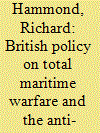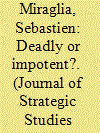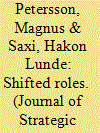| Srl | Item |
| 1 |
ID:
127119


|
|
|
|
|
| Publication |
2013.
|
| Summary/Abstract |
During World War II, the British ran a sustained anti-shipping campaign against Axis merchant and supply traffic in the Mediterranean. Although the effects of this on the land war in North Africa have been the subject of much debate, little attention has been paid to the nature and prosecution of the campaign itself. This article analyses the changes in British attitudes and policy towards attacking merchant shipping prior to and throughout the campaign. It then goes on to examine the conduct of the campaign itself and compare it with other British efforts elsewhere during the war. It concludes that the anti-shipping campaign in the Mediterranean was a unique combined arms offensive for the British, and a major evolution in their attitudes and policy towards maritime total war.
|
|
|
|
|
|
|
|
|
|
|
|
|
|
|
|
| 2 |
ID:
127136


|
|
|
|
|
| Publication |
2013.
|
| Summary/Abstract |
This article examines the nuclear command and control (C2) system implemented in Pakistan since 1998, and discusses its potential consequences for the risk of inadvertent or unauthorised use of nuclear weapons. I argue that troubled civil-military relations and Pakistan's doctrine of 'asymmetric escalation' account for the creation of a command and control system with different characteristics during peacetime and military crises. Although the key characteristics of Pakistan's nuclear C2 system allow relatively safe nuclear operations during peacetime, operational deployment of nuclear weapons during military standoffs is likely to include only rudimentary protections against inadvertent or unauthorised nuclear release. The implication of this study is that any shift from peacetime to wartime command and control procedures is likely to further destabilise Indo-Pakistani relations during the early stages of a diplomatic or military standoff, and introduce a non-trivial risk of accidental escalation to the nuclear level.
|
|
|
|
|
|
|
|
|
|
|
|
|
|
|
|
| 3 |
ID:
127183


|
|
|
|
|
| Publication |
2013.
|
| Summary/Abstract |
This article contains a reply to a previously published paper on the use and abuse of the so-called Dutch approach to counterinsurgency. In addition to commenting on this paper, the article constitutes an argument to initiate more comparative studies in the field of military and strategic studies. Only comparative studies will help to better understand the effectiveness of military force in preventing, containing and solving violent conflicts.
|
|
|
|
|
|
|
|
|
|
|
|
|
|
|
|
| 4 |
ID:
127131


|
|
|
|
|
| Publication |
2013.
|
| Summary/Abstract |
In January 1950 President Harry S. Truman announced that the United States would proceed with further work to determine the feasibility of a 'Super', or hydrogen, bomb. The events leading up to that decision - counter-pressures and advocacy from a number of quarters, including the divided Atomic Energy Commission (AEC), the nuclear scientists, Congress and the Pentagon - is well known. Less attention has been given to how the story of the Super came to be told in official and popular publications. Admiral Lewis L. Strauss, rogue member of the AEC, later presidential adviser on atomic affairs and AEC chairman, was one of the most vigorous advocates of developing thermonuclear weapons. He was also a highly skilled player of bureaucratic politics. This article draws upon the Strauss archives to examine how he used his position and his contacts to shape the history of the H-bomb to his own political advantage.
|
|
|
|
|
|
|
|
|
|
|
|
|
|
|
|
| 5 |
ID:
127188


|
|
|
|
|
| Publication |
2013.
|
| Summary/Abstract |
Professor Joseph Soeters shows admirable ambition in comparing national styles of conflict resolution and is extremely eager to draw historical lessons from such comparative exercises. However, he gets entangled in national mythmaking as he underestimates the complexity of comparative history of this kind. Particularly the establishment of true causal links between national (strategic) cultures and actual tactical behaviour on the ground is far more difficult than he suggests in his recent book chapter and his reply to my article in this journal.
|
|
|
|
|
|
|
|
|
|
|
|
|
|
|
|
| 6 |
ID:
127107


|
|
|
|
|
| Publication |
2013.
|
| Summary/Abstract |
During their 60 years within the North Atlantic Treaty Organisation (NATO), Denmark and Norway have experienced both high and low standings within the alliance, which can be attributed to both external and internal factors influencing their alliance strategies. During the 'first' Cold War and Détente, 1949-79, Danish and Norwegian alliance strategy aimed to simultaneously deter and reassure the Soviet Union. During the 'second' Cold War, 1979-89, Danish alliance policy became driven by domestic politics, and the Danish government was forced to formally dissociate the country from NATO's policies. Norway was not uncritical, but held a much lower profile. After the Cold War this situation shifted. Denmark successfully rehabilitated itself as a loyal and dependable ally by responding to the call for focusing on out-of-area operations. Meanwhile, Norway's continued focus on the lingering Russian Threat made the country seem out-of-touch with priorities in the post-Cold War alliance, and domestic politics prevented a more active out-of-area engagement.
|
|
|
|
|
|
|
|
|
|
|
|
|
|
|
|
| 7 |
ID:
127174


|
|
|
|
|
| Publication |
2013.
|
| Summary/Abstract |
This article argues that there is little evidence supporting the existence of the often praised, and allegedly subtle and successful 'Dutch approach' to stabilisation and counter-insurgency operations in Iraq or Afghanistan. It denounces the uncritical use of the term and refutes suggestions of historical and cultural roots to such an approach, for instance in Dutch colonial warfare in the Indonesian archipelago. It concludes by explaining the true conditions that gave rise to this notion, which seems to feed into a gratifying national self-image of the Dutch as non-martial, conflict averse and tolerant, rather than offering an original and successful formula for countering insurgencies.
|
|
|
|
|
|
|
|
|
|
|
|
|
|
|
|